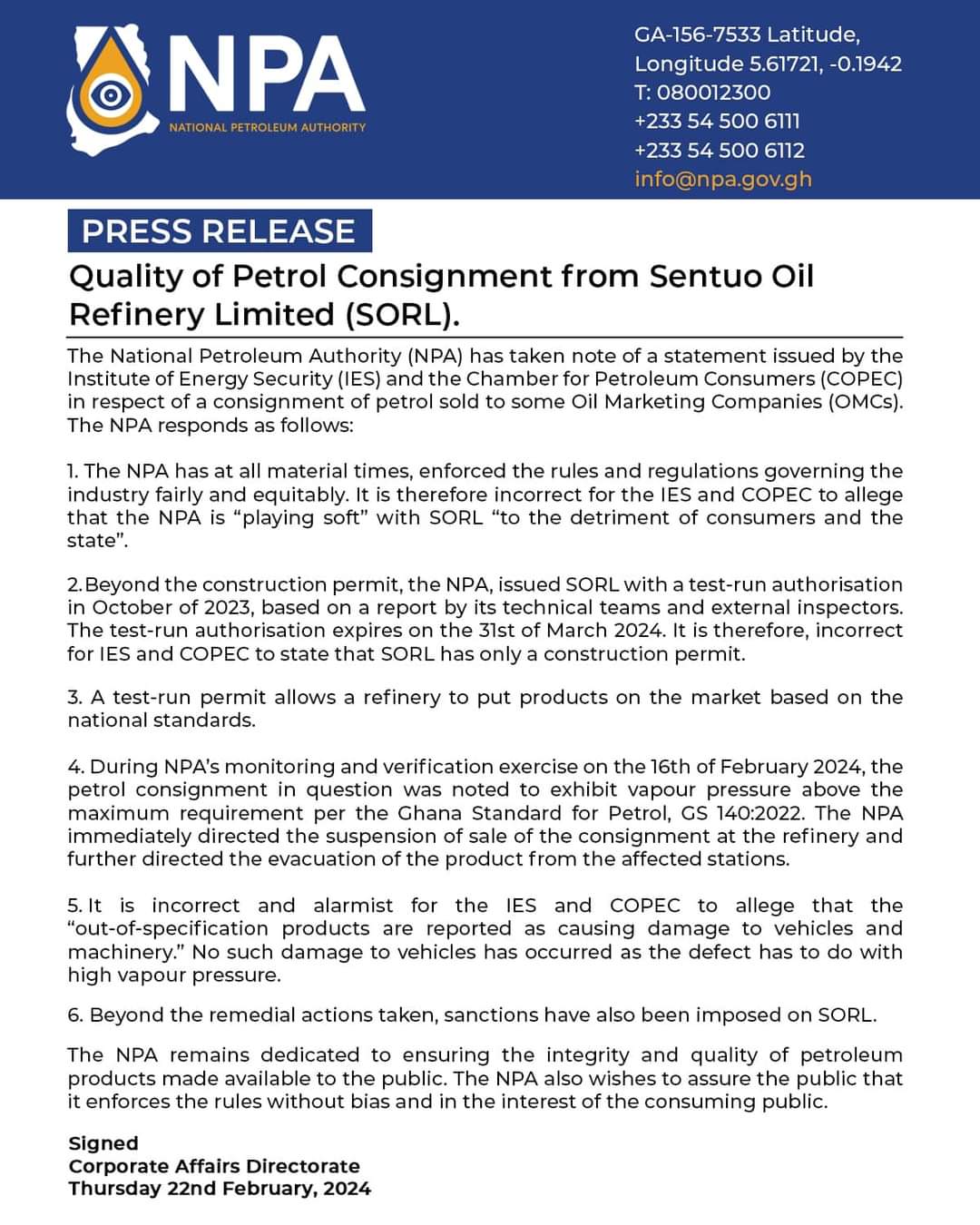
The Chief Executive Officer (CEO), of the National Petroleum Authority (NPA), Hassan Tampuli, has defended Cabinet’s new directives intended to curb fuel explosions in the country.
His comment is in reaction to a caution by former Minister for Environment, Science Technology and Innovation, Mahama Ayariga, who suggested that, Cabinet’s decision to suspend the construction of ongoing gas and petrol/diesel stations, is illegal.
On Thursday, a Cabinet meeting saw the introduction of some nine safety measures to ensure sanity within the fuel distribution chain nationwide, and to ostensibly curtail explosions.
These safety measures are aside President Nana Akufo-Addo ordering the implementation of the Cylinder Re-circulation Model of Liquefied Petroleum Gas (LPG) distribution.
Some of the directives have however been met with disagreements especially within the LPG retail sector.
But Mr. Tampuli, who was speaking on the Citi Breakfast Show, said, “This is a decision that is being taken by the President of the Republic of Ghana, in accordance with the constitution of Ghana, and other existing laws of the land. Article 57 vests executive powers in the President, and 58 (3) says the president can do so directly or through other officers who are subordinates to him. So even if the President decides to say that the Ministry of Information or Ministry of Energy should do this on his behalf, he’ll be doing this in accordance with law.”
In response to comments that cabinet is only an advisory body, the NPA boss said, “to a large extent, under the constitution, Cabinet is only an advisory body, but its decisions and directives are not decisions of the Cabinet. Per the statement, the President issued the directive on his mandate with cabinet playing an advisory role.”
Prior to the gas explosion at Atomic junction on October 7, there had been talks at government level regarding the implementation of the Cylinder Re-circulation Model of LPG distribution.
The model will ensure that LPG filling points are sited out of densely populated areas and commercial centres.
In the aftermath of the Atomic gas explosion which killed seven persons and injured some 132 others, talks on the Cylinder Re-circulation Model of LPG distribution intensified, resulting in cabinet’s swift move in introducing the nine directives meant to curb fuel explosions.
Cabinet’s Nine ‘Tough’ Decisions
- Immediate inspection of all gas stations and the vigorous enforcement of existing regulations by the National Petroleum Authority;
- Review of the current licensing regime to ensure that only those with demonstrable capacity and competence engage in the LPG distribution business;
- Institution of mandatory training and certification of the staff of Regulators, Oil Marketing Companies (OMCs) and LPG Marketing Companies to ensure the safe handling of LPG;
- Review the safety protocols along the entire value chain through the combined efforts of the Environmental Protection Agency (EPA), the National Petroleum Authority (NPA), Ghana Standards Authority (GSA), National Fire Service (NFS), Town and Country Planning Department of the Ministry of Environment, Science, Technology and Innovation and the Factories Inspectorate Department of the Ministry of Employment and Labour Relations;
- Deployment of a task force, within 30 days, to assess the risk that our current LPG infrastructure poses in terms of public health and safety. High-risk stations will be immediately closed down, in accordance with relevant law and without regard to any political or special interests. Low risk stations will be designated for the supply of gas for vehicles with improved safety standards;
- The immediate incorporation of standards and guidelines developed by Ghana Standards Authority on the handling, storage and distribution of LPG and other petroleum products as technical regulations to strengthen the enforcement regime;
- The recruitment by NPA of 200 safety auditors to join the staff of the Factories Inspectorate Department of the Ministry of Employment and Labour Relations to check regularly on all stations to ensure full compliance with safety standards and practices;
- Expedition of action by the Fire Service and the Police Service of on-going investigations. Any operator or regulatory official, against whom any act of criminal negligence is established, will face the full rigors of the law;
- Immediate cessation, until further notice, of all construction of facilities intended for use as gas or petroleum retail stations.
Of these nine directives, the impending closure of high-risk fuel stations across the country within 30-days, and the halting of the construction of new petrol/diesel and LPG filling points nationwide, have been described as “unfair.”
According to Mahama Ayariga, owners of these properties “have already obtained the necessary permits, have the appropriate clearance and have taken loans to invest in these projects, and that consequently, such a directive will only burden the owners.
But Mr. Tampuli maintains that “…governance is a dynamic arrangement. You do things based on the existences of the time. You cannot tell me that I should apply 2010 law to matters that have come up in 2017… We have to assess the situation and determine whether or not, even though the state has permitted you to put up that structure there, because of the information that has come to our notice currently, we do not think the permit we granted you to proceed is proper.”
“So we can take back the permit that has been given to you. The state has the power to do so. The state cannot be in a straight-jacket situation.”
–
By: Marie-Franz Fordjoe/citifmonline/Ghana
The Chief Executive Officer (CEO), of the National Petroleum Authority (NPA), Hassan Tampuli, has defended Cabinet’s new directives intended to curb fuel explosions in the country. His comment is in reaction to a caution by former Minister for Environment, Science Technology and Innovation, Mahama Ayariga, who suggested that, Cabinet’s decision to suspend the construction of ongoing ... Read Full Story


















Facebook
Twitter
Pinterest
Instagram
Google+
YouTube
LinkedIn
RSS